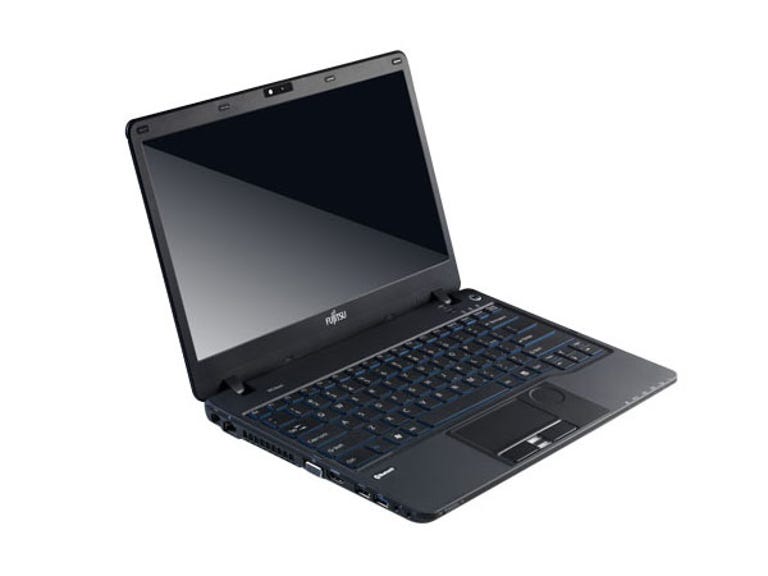 Why You Can Trust CNET
Why You Can Trust CNET Fujitsu LifeBook SH771 review: Fujitsu LifeBook SH771
The SH771 is a decent laptop that provides power and flexibility thanks to its full complement of ports, battery options and weight-saving features.
Editor's note: Fujitsu has informed us of an errant BIOS setting that was causing our strange hibernation issue — the review has been updated accordingly.
The Good
The Bad
The Bottom Line
Fujitsu's matte black SH771 is a nice reprieve to a world filled with ultrabooks — a strong, full-featured laptop. Despite not being an ultrabook it's still quite slim, at 23.2mm high. Weight isn't too bad either — if you swap out the optical drive for a space-saver and the mechanical for a solid-state drive (SSD), you can get it as low as 1.22kg.
A 13.3-inch gloss screen is the order of the day, which manages reasonable blacks and decent quality imagery via a 1366x768 resolution.
There's nothing amazing that standouts about the chassis design, aside from Fujitsu's now standard scroll-circle sitting next to the touch pad. We've always found it awkward to use, and weird that it's dedicated when the touch pad already supports Chiral motion scrolling. The scroll-circle can also adjust volume by tapping it, which then switches it into volume mode. Tap again, and you're back to scrolling. Other modes can be enabled through the control panel, although none are as useful.
The island-style keys are acceptable enough to type on, but have a slightly dead feel, lacking the spring that we've noticed in superior keyboards. Being of business heritage, don't expect a back-lit keyboard here — but you will get a fingerprint scanner. Speakers are also tiny, shrill and shouldn't be used for anything more than system sounds.
Expansion-wise, the SH771 features a full complement: VGA and HDMI ports, two USB 2.0 ports, a USB 3.0 port, gigabit Ethernet, an ExpressCard slot, SD card reader, and headphone/microphone jacks. If you need more battery, a second battery pack can be purchased to replace the optical drive.
Our review sample arrived with a Core i5 2520M CPU @ 2.5GHz, 4GB RAM and a 640GB, 7200rpm hard drive. The SH771 has an Intel Centrino Advanced-N 6205 chipset, which means it can use both 2.4GHz and 5GHz 802.11n networks, and Bluetooth was provided by the Broadcom BCM20702.
This configuration retails for AU$2188, while a Core i7 with 750GB HDD and 8GB RAM will set you back AU$2588. Swapping out the 750GB HDD for a 128GB SSD will bump the price up to AU$2588.
Application performance
Despite not being an ultrabook, performance wasn't that far removed; so we've compared it to some competing ultrabook models.
Choose a benchmark: Handbrake | iTunes | Photoshop | Multimedia
The full-powered processor makes itself known mostly in Photoshop and iTunes. Asus' ZenBook shows that a fast SSD in combination with a Core i7 can hold the fort, even though it's running at a lower clock rate.
Battery life
Despite the full-powered components in the LifeBook compared to the low-powered in ultrabooks, Fujitsu's product holds up quite well indeed.
We came across a weird issue in the SH771 while testing, though; regardless of what percentage the hibernate setting was set to, the laptop would always hibernate at 10 per cent battery with no warning. Fujitsu later confirmed this behaviour was due to a BIOS setting called "Auto save to disk", which was set to on. Turning it off returned the laptop to normal behaviour.
Conclusion
The SH771 is a decent laptop that provides power and flexibility thanks to its full complement of ports, battery options and weight-saving features. The odd battery bug is vexing, though, and we hope Fujitsu is able to rectify it soon.


